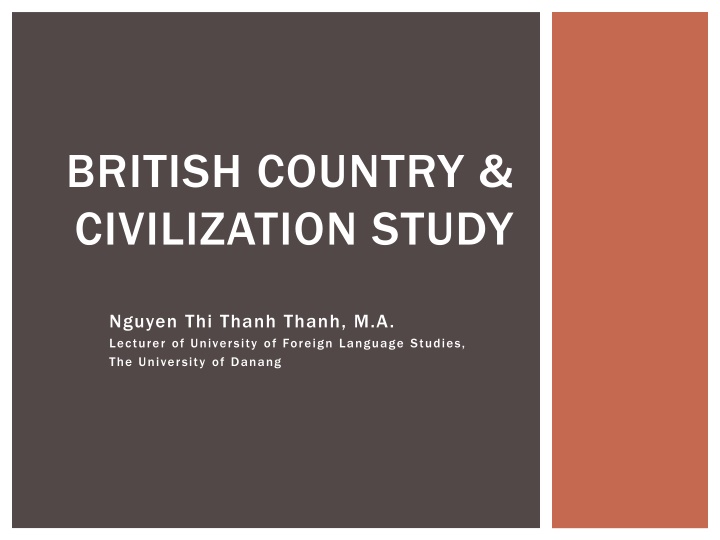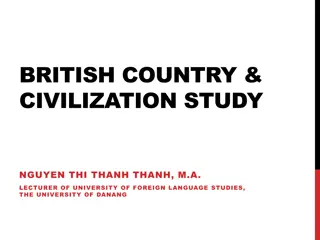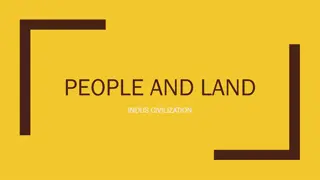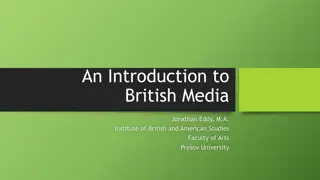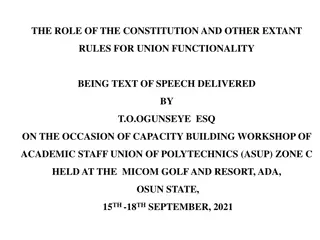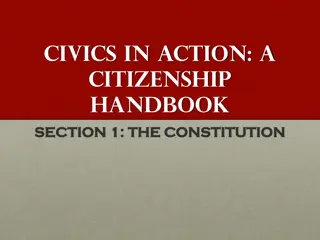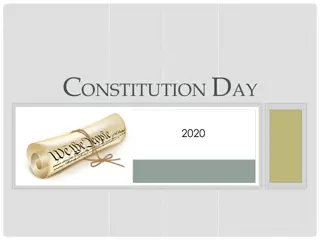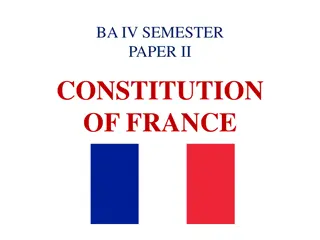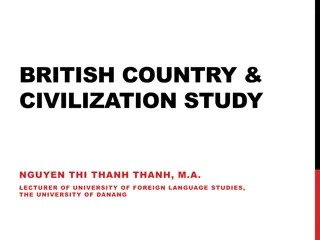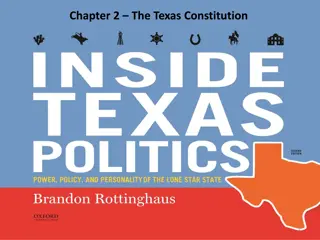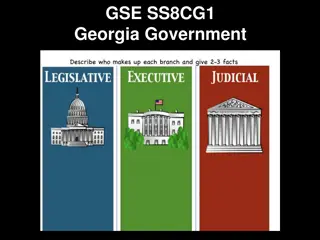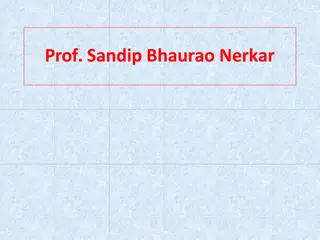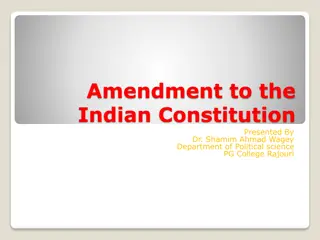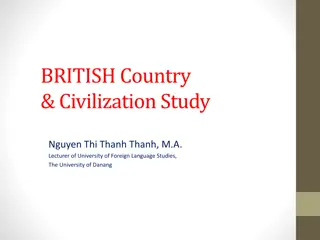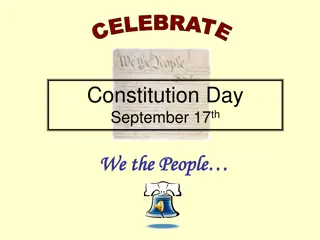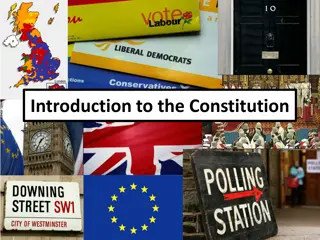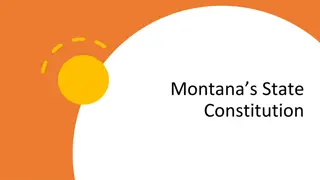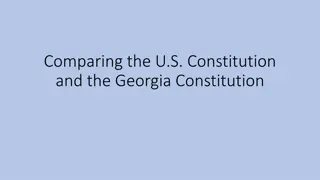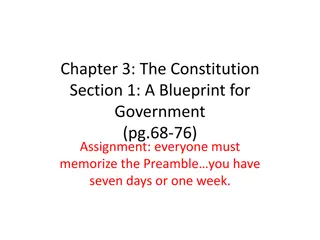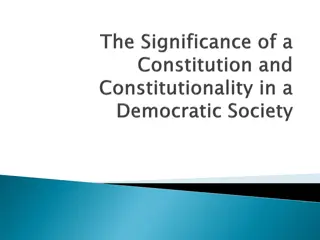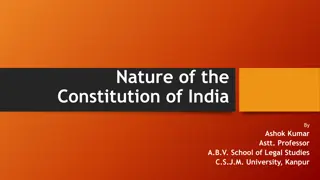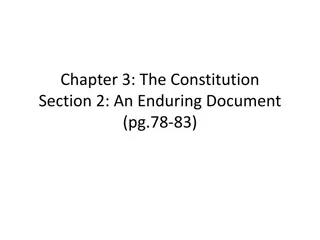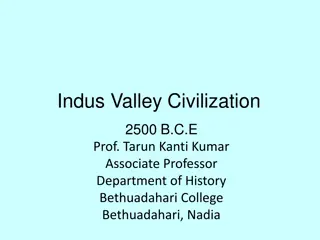British Country & Civilization Study: Government and Constitution Overview
The British Country & Civilization Study covers various aspects of the United Kingdom, including its government structure, constitution, history, education, and holidays. The UK is a parliamentary democracy with a constitutional monarchy, where the relationship between the State and the people relies on statute law, common law, and conventions. The UK Parliament holds supreme authority over government and law-making processes, with the executive branch comprising the Government and various related bodies. Understanding these key facets provides insight into the functioning of British society and governance.
Download Presentation

Please find below an Image/Link to download the presentation.
The content on the website is provided AS IS for your information and personal use only. It may not be sold, licensed, or shared on other websites without obtaining consent from the author.If you encounter any issues during the download, it is possible that the publisher has removed the file from their server.
You are allowed to download the files provided on this website for personal or commercial use, subject to the condition that they are used lawfully. All files are the property of their respective owners.
The content on the website is provided AS IS for your information and personal use only. It may not be sold, licensed, or shared on other websites without obtaining consent from the author.
E N D
Presentation Transcript
BRITISH COUNTRY & CIVILIZATION STUDY Nguyen Thi Thanh Thanh, M.A. Lecturer of University of Foreign Language Studies, The University of Danang
BRITISH GOVERNMENT
COURSE SYLLABUS BCSB1 COURSE SYLLABUS BCSB1 WEEK WEEK TITLE TITLE UNIT 1: THE UNITED KINGDOM UNIT 1: THE UNITED KINGDOM 1 UNIT 2: PEOPLE AND LANGUAGE UNIT 2: PEOPLE AND LANGUAGE 2 UNIT 3: SOME IMPORTANT EVENTS IN BRITISH HISTORY UNIT 3: SOME IMPORTANT EVENTS IN BRITISH HISTORY Assignment 1 Assignment 1 3 -4 UNIT 4: GOVERNMENT UNIT 4: GOVERNMENT UNIT 5: EDUCATION UNIT 5: EDUCATION 5 6 UNIT 6: HOLIDAY UNIT 6: HOLIDAY Assignment 2 Assignment 2 7-8
GOVERNMENT The United Kingdom is a parliamentary democracy democracy, based on universal suffrage. parliamentary It is also a constitutional monarchy constitutional monarchy in which ministers of the Crown govern in the name of the Sovereign, who is Head of State and Head of the Government.
GOVERNMENT There is no single document that forms the UK constitution; instead, the relationship between the State and the people relies on statute law statute law, common law and conventions.
GOVERNMENT The UK Parliament (the legislature) makes primary legislation, legislation, primary Under the constitution, Parliament is supreme and Parliament is supreme and has authority over government and law has authority over government and law- -making United Kingdom as a whole. making in the
GOVERNMENT The executive comprises the Government (members of the Cabinet and other ministers responsible for policies); government departments and agencies; local authorities; public corporations; independent regulatory bodies; and certain other organizations subject to ministerial control.
GOVERNMENT The Government derives its authority and derives its authority and membership from Parliament membership from Parliament and can only stay in office if it is able to command a majority in the House of Commons. The judiciary determines common law and The judiciary determines common law and interprets legislation. interprets legislation.
GOVERNMENT As Monarch, The Queen and plays an integral part in the legislature and plays an integral part in the legislature. The Queen is head of the executive head of the executive The Queen heads commander-in-chief of all the Armed Forces of the Crown and supreme governor of the established Church of England. heads the judiciary and is both the In practice, the Monarch acts on the advice of her ministers.
PARLIAMENTARY ELECTORAL SYSTEM PARLIAMENTARY ELECTORAL SYSTEM The constituencies, each of which returns one Member of Parliament (MP) to the House of Commons. Constituencies vary in size and area; the average electorate is around 67,300. The largest electorate United Kingdom is divided into 659 in December 2003 was the Isle of Wight (with 106,600 registered voters) and the smallest the sparsely populated Eilean Siar (21,300).
VOTERS VOTERS UK Commonwealth countries and the Republic of Ireland resident in the United Kingdom, may vote in elections to the UK Parliament citizens, and citizens of other provided that they are aged 18 or over; included in the register of electors for the constituency; and not subject to any legal incapacity to vote.
VOTERS VOTERS Members of the Armed Forces, Crown servants and staff of the British Council employed overseas (together with their wives or husbands if accompanying them) may be registered as service voters British citizens living overseas are entitled to register at their last UK constituency and to vote for up to15 years after moving abroad.
VOTERS VOTERS People not entitled to vote include: members of the House of Lords, foreign nationals (other than qualifying Commonwealth citizens or citizens of the Republic of Ireland) resident in the United Kingdom, some patients detained under mental health legislation, convicted prisoners detained in a penal institution, and people convicted within the previous five years of corrupt or illegal election practices.
VOTING PROCEDURES VOTING PROCEDURES Voting is not compulsory in the United Kingdom At Westminster elections, each elector may cast one vote and usually does so in person at a polling station. As part of its plans to modernize the electoral system, the Government has taken a number of measures designed to make voting more accessible for the electorate and allow people more flexibility in where and when they vote
CANDIDATES CANDIDATES British citizens, and resident citizens of other Commonwealth countries and the Republic of Ireland, may be elected as MPs provided that they are aged 21 or over and are not disqualified. Disqualified people include members of the House of Lords; and holders of certain offices listed in the House of Commons Disqualification Act 1975.
PRACTICE Write T for true and F or false. Correct the false statements. Write T for true and F or false. Correct the false statements. T............. For electoral purpose, the UK is divided into constituencies. ..T........... British citizens who are not subject to any incapacity may vote. ....T......... Only members of the House of Lords are not entitled to vote. ......F....... Everyone must vote. ........T..... The simple majority system of voting is used. ..........T... The minimum voting age is 18. ............T. The minimum age of candidacy is 18
THE PARTY POLITICAL SYSTEM THE PARTY POLITICAL SYSTEM The origins of the Conservative Party go back to the 18th century, while the Labour Party emerged in the last decade of the 19th century. The Liberal Democrats were formed in 1988 when the Liberal Party, which also traced its origins to the 18th century, merged with the Social Democratic Party, formed in 1981. Other parties include two nationalist parties, Plaid Cymru
THE PARTY POLITICAL SYSTEM THE PARTY POLITICAL SYSTEM The party that wins most seats at a General Election - becomes the Government. By tradition, the Sovereign invites the leader of that party to form a government. The largest minority party becomes the official Opposition, with its own leader and shadow cabinet .
THE PARTY POLITICAL SYSTEM THE PARTY POLITICAL SYSTEM The Party of Wales (founded in 1925) and the Scottish National Party (founded in 1934). Northern Ireland has a number of parties. They include the Ulster Unionists, formed in the early part of the 20th century; the Democratic Unionists, founded in 1971 by a group that broke away from the Ulster Unionists; the Social Democratic and Labour Party, founded in 1970; and Sinn F in, which is the political wing of the Irish Republican Army.
THE PARTY POLITICAL SYSTEM THE PARTY POLITICAL SYSTEM Since 1945, the traditional two-party system of government in the UK Parliament has been maintained, with power being held by either the Conservative Party or the Labour Party. Each has won eight General Elections in this period, the Labour Party being successful in the most recent General Election in 2001.
PRACTICE Write T for true and F for False. Correct the false statements. Write T for true and F for False. Correct the false statements. T............... The Liberal Democrats was formed when the Liberal Party merged with the Social Democratic Party. ..F........... The majority party usually forms the Government. ....F......... The minority party becomes the official Opposition. ......T....... The government is invited to form Shadow Cabinet. .......T....... Since 1945 either the Conservative Party or the Labour Party has held power. ........T........ The two-party system of government is maintained in the UK. ..........T....... At present the Labour Party is in power.
PRACTICE MPs at July 2004 MPs at July 2004 MPs elected in 2001 MPs elected in 2001 General Election General Election State of the Parties in the UK Parliament Labour Labour1 1 407 412 412 Conser Conserv vative ative 163 166 166 Libe Liber ral al Democ Democr rats ats 55 52 52 Scottish Scottish National National 5 5 5 Plaid Plaid Cymru Cymru T The he P Party arty of of W Wales ales 4 4 4 Democ Democr ratic atic Unionist Unionist 6 5 5 Ulster Ulster Unionist Unionist 5 6 6 Sinn Sinn F in2 F in2 4 4 4 Social Social Democ Democr ratic atic and and Labour Labour 3 3 3 KHHC3 KHHC3 1 1 1 Independent Independent Conser Conserv vative ative 1 . . Independent Independent Labour Labour 1 . . Other Other parties parties 0 0 0 Spea Speak ker er and and three three deputies4 deputies4 4 4 1 1
PARLIAMENT PARLIAMENT The UK Parliament is one of the oldest representative assemblies in the world, with its origins in the 13th century. During the 14th century two distinct Houses of Parliament began to emerge, with the Commons sitting apart from the Upper House from 1341. It was also accepted that there should be no taxation without parliamentary consent, which remains a fundamental principle. There are three parts of Parliament the elected House of Commons, the appointed House of Lords and the Sovereign.
PARLIAMENT PARLIAMENT - - FUNCTIONS FUNCTIONS The main functions of Parliament are: to pass laws; to provide (by voting for taxation) the means of carrying on the work of government; to scrutinise government policy and administration, including proposals for expenditure; and to debate the major issues of the day.
PARLIAMENT PARLIAMENT - - MEETINGS MEETINGS A Parliament has a maximum life of five years, but not all Parliaments serve their full term. The life of a Westminster Parliament is divided into sessions. Each usually lasts a year normally beginning in November and ending in October or November
PARLIAMENT PARLIAMENT - - MEETINGS MEETINGS At the start of each session the Sovereign s speech to Parliament outlines the Government s policies and proposed legislative programme. Each session is ended by the Sovereign dismissing it called prorogation . Parliament then stands prorogued for a few days until the new session begins. Prorogation brings to an end nearly all parliamentary business.
THE PARTY SYSTEM IN PARLIAMENT THE PARTY SYSTEM IN PARLIAMENT Leaders of the Government and Opposition, with members of the Cabinet and shadow Cabinet respectively, sit opposite one another on the front benches in the debating chamber of the House of Commons. Their supporters, the backbenchers , sit behind them. Benches to the right of the Speaker are used by the Government and its supporters; those to the left are occupied by the Opposition and members of the other parties. In general, the Opposition contributes to the formulation of policy and legislation by constructive criticism; opposes government proposals with which it disagrees; tables amendments to Government Bills; and puts forward its own policies in order to improve its chances of winning the next General Election.
THE PARTY SYSTEM IN PARLIAMENT THE PARTY SYSTEM IN PARLIAMENT The Government Chief Whips in the Commons and the Lords, in consultation with their Opposition counterparts, arrange the scheduling of government business under the direction of the Prime Minister and the Leaders of the two Houses. The Chief Whips and their assistants, who are usually chosen by the party leaders, manage their parliamentary parties. Their duties include keeping members informed of forthcoming parliamentary business, maintaining the party s voting strength by ensuring members attend important debates, and passing on to the party leadership the opinions of backbench members. The term whip also applies to the weekly circular sent out by each Chief Whip to all their MPs or peers notifying them of parliamentary business. The degree of importance is indicated by the number of times that the debate or division is underlined. Items underlined once are routine and underlined. Items underlined once are routine and intends to be absent. A three-line whip , when an item is underlined three times, indicates that attendance is required and pairing is not normally allowed. This is imposed on important occasions, such as second readings of major Bills and motions of no confidence.
HOUSE OF COMMONS HOUSE OF COMMONS The House of Commons consists of 659 elected MPs, of whom 529 represent constituencies in England, 40 in Wales, 72 in Scotland and 18 in Northern Ireland. After a Parliament has been dissolved, and a General Election has been held, the Sovereign summons a new Parliament. When an MP dies, resigns or is made a member of the House of Lords, a by- election takes place.
OFFICERS OF THE HOUSE OF COMMONS OFFICERS OF THE HOUSE OF COMMONS The chief officer of the House of Commons is the Speaker, an MP elected by other MPs to preside over the House. Other officers include the Chairman of Ways and Means and two deputy chairmen, who are also MPs and may act as Deputy Speakers.
OFFICERS OF THE HOUSE OF COMMONS OFFICERS OF THE HOUSE OF COMMONS Permanent officers (who are not MPs) include the Clerk of the House of Commons the principal adviser to the Speaker on the House s privileges and procedures. The Clerk s other responsibilities relate to the conduct of the business of the House and its committees. The Clerk is also accounting officer for the House.
HOUSE OF LORDS HOUSE OF LORDS The House of Lords consists of: hereditary peers; life peers created to help carry out the judicial duties of the House (up to 12 Lords of Appeal in Ordinary or Law Lords and a number of other Lords of Appeal); all other life peers; and the Archbishops of Canterbury and York, the Bishops of London, Durham and Winchester, and the 21 next most senior bishops of the Church of England.
HOUSE OF LORDS HOUSE OF LORDS Members of the House of Lords do not receive a salary for their parliamentary work, but they can claim for expenses incurred in attending the House and for certain travelling expenses. In June 2003 the Government announced a number of major constitutional changes, including the creation of the Department for Constitutional Affairs, which replaced the Lord Chancellor s Department
THE QUEEN In addition to being the Sovereign of the United Kingdom, The Queen is H Head of Sta Stat te of e of 15 other 15 other r realms and Head of ealms and Head of the the Co Commo mmon nw wealth ealth. ead of In each country where she is Head of State, Her Majesty is represented by a Governor-General, appointed by her on the advice of the ministers of the country concerned and independent of the UK Government.
THE MONARCHY The Monarchy is the oldest institution of government. The Queen s full title is Elizabeth the Second, by the Grace of God, of the United Kingdom of Great Britain and Northern Ireland and of Her other Realms and Territories Queen, Head of the Commonwealth, Defender of the Faith .
SUCCESSION SUCCESSION The first seven members of the Royal Family in order of succession to the Throne are: The Prince of Wales, Prince William of Wales, Prince Henry of Wales, The Duke of York, Princess Beatrice of York, Princess Eugenie of York and The Earl of Wessex. Lady Louise Windsor, the daughter of The Earl and Countess of Wessex, became eighth in line to the throne on her birth in November 2003.
SUCCESSION SUCCESSION The Sovereign succeeds to the throne as soon as his or her predecessor dies: there is no interval without a ruler. He or she is at once proclaimed at an Accession Council, to which all members of the Privy Council are called. Members of the House of Lords, the Lord Mayor, Aldermen and other leading citizens of the City of London are also invited.
THE MONARCHS ROLE IN GOVERNMENT THE MONARCH S ROLE IN GOVERNMENT Over time the Monarchy s power has been gradually reduced. The queen s influence is mainly informal and, having expressed her views, she abides by the advice of her ministers. The Queen continues to perform a range of duties, such as summoning and dissolving Parliament, and giving Royal Assent to legislation passed by the UK or Scottish Parliament or, when it is sitting, by the Northern Ireland Assembly.
THE MONARCHS ROLE IN GOVERNMENT THE MONARCH S ROLE IN GOVERNMENT The Queen holds Privy Council meetings, gives audiences to her ministers and officials in the United Kingdom and overseas, receives accounts of Cabinet decisions, read dispatches and signs State papers. She is consulted on many aspects of national life, and must show complete impartiality.
SUMMARY: THE UNITED KINGDOM S GOVERNMENT Parliament Voters - Voting procedures Candidates The party political system Parliament Functions & Meetings The party system in Parliament Houses of Commons Houses of Lords The Queen The Monarchy Successions NEXT LESSON: NEXT LESSON:
THANK YOU FOR YOUR LISTENING
